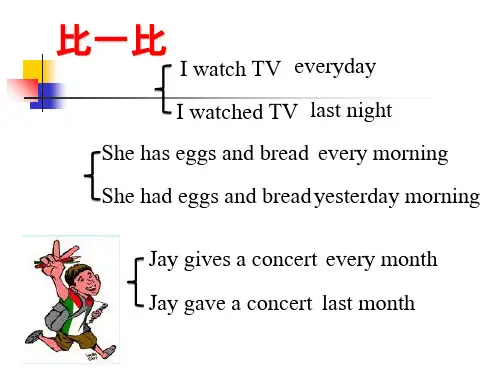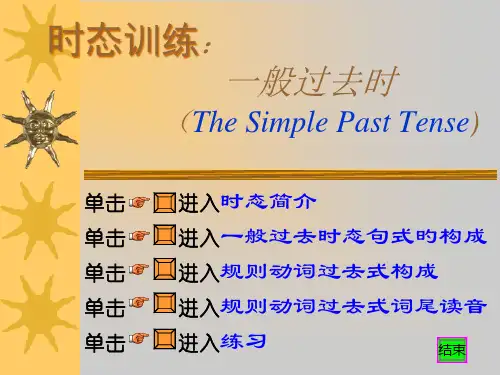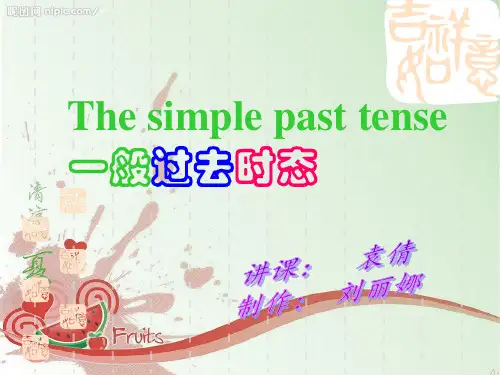初中讲一般过去时课件(PPT)
合集下载
一般过去时学习ppt课件

Lucy __d_id_n_’_t_ ___d_o___ her homework at home. 2、He found some meat in the fridge.(变一般疑问句)
__D_i_d__ he __f_in_d_ ___a_n_y_ meat in the fridge? 3、She stayed there for a week.(对划线部分提问)
2、His father worked all day last Monday.(改一般疑问句) __D_i_d__his father ___w_o_r_k__ all day last Monday?
3、 I was very busy last week. (改否定句和一般疑问句) I __w__as_n_’_t_ very busy last week. _W__er_e_ you very busy last week?
2. 结尾是 e 的动词加 -d
3. 末尾只有一个辅音字母的重读 闭音节词,先双写这个辅音字 母,再加-ed
look play start live hope use
stop plan trip
looked played started lived hoped used
stopped planned tripped
/t/ /d/ 之后念 /id/ , 即 ed 在 /t/ /d/ 音后面念 /id/
例:wanted shouted needed counted
“雪亮工程"是以区(县)、乡(镇) 、村( 社区) 三级综 治中心 为指挥 平台、 以综治 信息化 为支撑 、以网 格化管 理为基 础、以 公共安 全视频 监控联 网应用 为重点 的“群 众性治 安防控 工程” 。
一般过去时.语法讲解PPT

时间状语不同
一般过去时常用的时间状语包括过去的时间点、过去的时间段 等,而过去完成时常用的时间状语包括“已经”、“之前”等
。
05
一般过去时的练习与巩固
填空练习
总结词
填空练习是巩固一般过去时的有效方法,通过在句子中留空,让学生填写正确的动词时态,加深对一般过去时的 理解和运用。
详细描述
在填空练习中,教师可以选择一些包含一般过去时的句子,故意去掉动词时态部分,让学生根据上下文语境和时 态规则填写正确的时态。例如,“Yesterday, I ____(go) to the park with my family. We ____ (have) a great time.” 学生应该填写“went”和“had”。
表示过去的习惯或经常发生的动作
描述过去的习惯
一般过去时可以用来描述过去经常发 生的动作或习惯,例如“He used to smoke a pack of cigarettes a day” (他以前每天抽一包烟)。
描述过去的频率
一般过去时可以用来表示过去某个时间 段内发生的动作的频率,例如“We met every week”(我们每周见面一 次)。
一般过去时表示动作已经完成,而过去进行时则表示动作正在进行中。
总结词
时间状语不同
详细描述
一般过去时常用的时间状语包括过去的时间点、过去的时间段等,而 过去进行时常用的时间状语包括“当时”、“正在”等。
与过去完成时混淆的用法
总结词 详细描述
总结词 详细描述
动作是否完成
一般过去时表示动作已经完成,而过去完成时则表示在过去的 某个时间点之前已经完成的动作。
选择练习
总结词
选择练习是一种常见的练习方式,通过提供多个选项,让学生选择符合语境和语法规则的答案,进一 步巩固一般过去时的运用。
一般过去时常用的时间状语包括过去的时间点、过去的时间段 等,而过去完成时常用的时间状语包括“已经”、“之前”等
。
05
一般过去时的练习与巩固
填空练习
总结词
填空练习是巩固一般过去时的有效方法,通过在句子中留空,让学生填写正确的动词时态,加深对一般过去时的 理解和运用。
详细描述
在填空练习中,教师可以选择一些包含一般过去时的句子,故意去掉动词时态部分,让学生根据上下文语境和时 态规则填写正确的时态。例如,“Yesterday, I ____(go) to the park with my family. We ____ (have) a great time.” 学生应该填写“went”和“had”。
表示过去的习惯或经常发生的动作
描述过去的习惯
一般过去时可以用来描述过去经常发 生的动作或习惯,例如“He used to smoke a pack of cigarettes a day” (他以前每天抽一包烟)。
描述过去的频率
一般过去时可以用来表示过去某个时间 段内发生的动作的频率,例如“We met every week”(我们每周见面一 次)。
一般过去时表示动作已经完成,而过去进行时则表示动作正在进行中。
总结词
时间状语不同
详细描述
一般过去时常用的时间状语包括过去的时间点、过去的时间段等,而 过去进行时常用的时间状语包括“当时”、“正在”等。
与过去完成时混淆的用法
总结词 详细描述
总结词 详细描述
动作是否完成
一般过去时表示动作已经完成,而过去完成时则表示在过去的 某个时间点之前已经完成的动作。
选择练习
总结词
选择练习是一种常见的练习方式,通过提供多个选项,让学生选择符合语境和语法规则的答案,进一 步巩固一般过去时的运用。
一般过去时PPT获奖课件

Just now 刚刚 Last week 上周 in the past 过去 that day 那天 last year 去年 that year 那年 that month 那个月 just now 刚刚
一般过去时态句式旳构成
陈说句式
动词
肯定式
否定式
I was ….
I was not(wasn’t)….
订正答案 返回练习
一般过去时态练习
把下列句子改成相应时态
1. He usually gets up early in the morning.
But he
got up
late today.
2. She usually works from 8 a.m. to 5 p.m.
But yesterday she worked from 8 a.m. to 6 p.m.
3. stop 6. trip 9. want 12.have e 18.put 21.read
订正答案 返回上页
动词过去式转换练习
答案
1. look looked 4. carry carried 7. call called 10.are were 13.do did 16.say said 19.eat ate
did not(didn’t) work.
There was …. there There were…. be
There was not (wasn’t) …. There were not (weren’t)…问句式
动词
疑问句式和简略答语
第一人称
第二人称
be He /She/it was….
He/She/It was not(wasn’t)….
初中英语一般过去时课件(PPT)

played
did
don’t/ doesn’t
She doesn’t play basketball after school. She _________ basketball after school yesterday.
do/ does
didn’t
did
didn’t watch
didn’t play
一、句型转换 1. The children had a good time in the park. 否定句:The children did not have a good time in the park. 一般疑问句:Did the children have a good time in the park? 对划线部分提问:Where did the children have a good time? 2. There were about nine hundred people at the cinema. 否定句:There were not about nine hundred people at the cinema. 一般疑问句:Were there about nine hundred people at the cinema? 对划线部分提问:How many people at the cinema?
Did
Did
go
go
规则变化 1.一般加ed
2.以e结尾加d
3.末尾只有一个辅音字母的重读闭音节词,先双写这个辅音字母,再加ed .
work —
worked
change —
changed
prefer —
preferred
stop —
did
don’t/ doesn’t
She doesn’t play basketball after school. She _________ basketball after school yesterday.
do/ does
didn’t
did
didn’t watch
didn’t play
一、句型转换 1. The children had a good time in the park. 否定句:The children did not have a good time in the park. 一般疑问句:Did the children have a good time in the park? 对划线部分提问:Where did the children have a good time? 2. There were about nine hundred people at the cinema. 否定句:There were not about nine hundred people at the cinema. 一般疑问句:Were there about nine hundred people at the cinema? 对划线部分提问:How many people at the cinema?
Did
Did
go
go
规则变化 1.一般加ed
2.以e结尾加d
3.末尾只有一个辅音字母的重读闭音节词,先双写这个辅音字母,再加ed .
work —
worked
change —
changed
prefer —
preferred
stop —
一般过去时(12张PPT)初中英语专项复习课件

The Country mouse went to the house of the City mouse. It was a very good house. Nice food was set ready for them to eat. But just as they began to eat they heard a great noise. The City mouse cried, " Run! Run! The cat is coming!" They ran away quickly and hid.
一般过去时 初中英语专项分析
一般现在时 de 应用场景
过
动作行为
去
发
生
曾经
的
存在的状态
识别 标志词 理解 句意
答题技巧
熟练 动词 转换
yesterday last week 3 days ago
动词 过去式
熟练 句型 转换
肯定 否定 疑问
一般 过去时 He played basketball yesterday.
yesterday? Yes, I did. No, I didn’t.
动词 过去式 形态的变化
一般
直接加 ed
二般
以 e 结尾,去 e 加 ed live dance hope use
动词 过去式 形态的变化
三般
重读辅元辅,双写尾字母
stop plan
四般
辅音字母 + y 结尾,把 y 变 i 加 ed cry study worry
标志词
时间状语:last night, yesterday, the day before yesterday last week, some years ago in 1995, the other day, just now, in the past
一般过去时 初中英语专项分析
一般现在时 de 应用场景
过
动作行为
去
发
生
曾经
的
存在的状态
识别 标志词 理解 句意
答题技巧
熟练 动词 转换
yesterday last week 3 days ago
动词 过去式
熟练 句型 转换
肯定 否定 疑问
一般 过去时 He played basketball yesterday.
yesterday? Yes, I did. No, I didn’t.
动词 过去式 形态的变化
一般
直接加 ed
二般
以 e 结尾,去 e 加 ed live dance hope use
动词 过去式 形态的变化
三般
重读辅元辅,双写尾字母
stop plan
四般
辅音字母 + y 结尾,把 y 变 i 加 ed cry study worry
标志词
时间状语:last night, yesterday, the day before yesterday last week, some years ago in 1995, the other day, just now, in the past
一般过去时课件(PPT)

B pictures in the park 1.I ___
Exercises
last weekend. A.take B.took C.was D.draw
A 2. Did you ___football yesterday. A. play B. played C. were D. are
A 3.He always _____me last term. A. helped B. helps C. helping D. help 4.Where did you ___last B Monday? A.went B.go C.do D.did
climbed a mountain
mped
fly kites read a book sing and dance eat good food
swim do am/is are study
flew kites read a book sang and danced ate good food
6. He usually gets ____ (get) up at 6 getting in the morning. Look! He is ______ (get) up now. But yesterday he got (get) up very late, so he ____ went (go) to school late. He was ____ ___ (be) late for school.
动词原形、第三人称单数 动词过去式
They don’t watch TV in the evening. didn’t watch TV last night. They _________
She doesn’t play basketball after school. She _________ didn’t play basketball after school yesterday. Do you go to school on foot every day? go to school on foot yesterday. ___ Did you __ Does he go to school by bus every day?
讲解(一般过去时)ppt课件
4
句型变化 1.系动词be
陈述句(肯定): She was a doctor two years ago. 陈述句(否定): She was not a doctor two years ago. 一般疑问句: Was she a doctor two years ago?
肯定回答:Yes, she was. 否定回答:No, she wasn’t. 特殊疑问句: When was she a doctor?
5
动词一般过去时,表示过去发生的事; be用was或用were, have,has变had; 谓语动词过去式,过去时间坐标志; 一般动词加-ed,若是特殊得硬记。 否定句很简单,主语之后didn’t添; 疑问句也不难,did放在主语前; 如果谓语之前有did,谓语动词需还原; 动词若是was,were,否定就把not添。
• 为什么她去年离开了学校? Why did she leave the 时
• 1.定义: 1)表示过去某个时间发生的动作或存在的状态,常和 表示过去的时间状语连用;2)也表示过去经常或反复发生的动 作,常和表示频度的时间状语连用。
• 标志性状语
2.时间状语:yesterday last night
6
7
8
• 1. look • 4. carry • 7. call • 10.like • 13.dance • 16.stay
2. live 5. hope 8. finish 11.play 14.cry 17.cook
3. stop 6. trip 9. want 12.watch 15.plan 18.invent
3. _____________________ on Sundays. They went to the park last Monday.
句型变化 1.系动词be
陈述句(肯定): She was a doctor two years ago. 陈述句(否定): She was not a doctor two years ago. 一般疑问句: Was she a doctor two years ago?
肯定回答:Yes, she was. 否定回答:No, she wasn’t. 特殊疑问句: When was she a doctor?
5
动词一般过去时,表示过去发生的事; be用was或用were, have,has变had; 谓语动词过去式,过去时间坐标志; 一般动词加-ed,若是特殊得硬记。 否定句很简单,主语之后didn’t添; 疑问句也不难,did放在主语前; 如果谓语之前有did,谓语动词需还原; 动词若是was,were,否定就把not添。
• 为什么她去年离开了学校? Why did she leave the 时
• 1.定义: 1)表示过去某个时间发生的动作或存在的状态,常和 表示过去的时间状语连用;2)也表示过去经常或反复发生的动 作,常和表示频度的时间状语连用。
• 标志性状语
2.时间状语:yesterday last night
6
7
8
• 1. look • 4. carry • 7. call • 10.like • 13.dance • 16.stay
2. live 5. hope 8. finish 11.play 14.cry 17.cook
3. stop 6. trip 9. want 12.watch 15.plan 18.invent
3. _____________________ on Sundays. They went to the park last Monday.
初中英语一般过去时教学ppt课件
再加 –ed,如: stop---stopped 5. 不规则动词的过去式变化规律性不强,需多加记忆,如:
go---went, get---got, buy---bought 等
8
04
常用时间状语
9
常用时间状语
last week tomorrow yesterday often two years ago sometimes at this weekend now usually
疑问词+was/were+主语+其他 Where were you last night?
17
Summary
1. 一般过去时与一般现在时和 一般将来时的区别
2. 一般过去时 定义&结构 3. 动词过去式变形 4. 常用的时间状语 5. 否定句&疑问句形态
18
THANK YOU
19
past present
future
3
02
一般过去时 定义 & 结构
4
一般过去时定义
• 描述在过去的时间里发生的事情 或存在的状态
• Last weekend, I went to the zoo.
5
一般过去时结构
主语+动词过去式+其他+(时间状语) 例句:He read a book sterday • last night/ week/ month/ year/ weekend/ Monday…… • 数字 + day(s) / week(s) / month (s) / year(s) + ago • then (那时)
11
一般现在时 & 一般过去式转换
6
go---went, get---got, buy---bought 等
8
04
常用时间状语
9
常用时间状语
last week tomorrow yesterday often two years ago sometimes at this weekend now usually
疑问词+was/were+主语+其他 Where were you last night?
17
Summary
1. 一般过去时与一般现在时和 一般将来时的区别
2. 一般过去时 定义&结构 3. 动词过去式变形 4. 常用的时间状语 5. 否定句&疑问句形态
18
THANK YOU
19
past present
future
3
02
一般过去时 定义 & 结构
4
一般过去时定义
• 描述在过去的时间里发生的事情 或存在的状态
• Last weekend, I went to the zoo.
5
一般过去时结构
主语+动词过去式+其他+(时间状语) 例句:He read a book sterday • last night/ week/ month/ year/ weekend/ Monday…… • 数字 + day(s) / week(s) / month (s) / year(s) + ago • then (那时)
11
一般现在时 & 一般过去式转换
6
一般过去时的讲解ppt课件完整版
“studied”。
助动词did的用法
在一般过去时中,助 动词“did”用于构 成疑问句和否定句。
在回答一般过去时的 疑问句时,可以用 “did”的相应形式 进行回答。
“did”后面跟动词 原形,表示过去某个 时间发生的动作或状 态。
一般过去时的否定句和疑问句
否定句
在动词前加“didn’t”,后面跟动词原形,表示过去某个时间没有发生的动 作或状态。例如:“I didn’t go to the park yesterday.”(昨天我没有去公 园。)
陈述句改疑问句
指导学生将一般过去时的 陈述句改写为疑问句,注 意语序的调整和助动词 did的使用。
特殊疑问句的回答
给出特殊疑问句及其回答 ,让学生熟悉一般过去时 特殊疑问句的构成和回答 方式。
阅读理解中一般过去时的识别与运用
阅读文章并回答问题
提供一篇含有一般过去时的文章,让学生阅读后回答与文章内容 相关的问题。
疑问句
将助动词“did”放在主语前构成疑问句,表示询问过去某个时间是否发生了某 个动作或状态。例如:“Did you go to the park yesterday?”(昨天你去公 园了吗?)
04
一般过去时的重点与难点
BIG DATA EMPOWERS TO CREATE A NEW
ERA
不规则动词的过去式
识别一般过去时的标志词
列出一般过去时的常见标志词,如yesterday, last week等,让学 生在阅读过程中识别并标注出来。
运用一般过去时描述事件
要求学生运用一般过去时描述一个发生在过去的事件,注意动词过 去式的正确使用和句子结构的完整性。
THANKS
感谢观看
1 2
助动词did的用法
在一般过去时中,助 动词“did”用于构 成疑问句和否定句。
在回答一般过去时的 疑问句时,可以用 “did”的相应形式 进行回答。
“did”后面跟动词 原形,表示过去某个 时间发生的动作或状 态。
一般过去时的否定句和疑问句
否定句
在动词前加“didn’t”,后面跟动词原形,表示过去某个时间没有发生的动 作或状态。例如:“I didn’t go to the park yesterday.”(昨天我没有去公 园。)
陈述句改疑问句
指导学生将一般过去时的 陈述句改写为疑问句,注 意语序的调整和助动词 did的使用。
特殊疑问句的回答
给出特殊疑问句及其回答 ,让学生熟悉一般过去时 特殊疑问句的构成和回答 方式。
阅读理解中一般过去时的识别与运用
阅读文章并回答问题
提供一篇含有一般过去时的文章,让学生阅读后回答与文章内容 相关的问题。
疑问句
将助动词“did”放在主语前构成疑问句,表示询问过去某个时间是否发生了某 个动作或状态。例如:“Did you go to the park yesterday?”(昨天你去公 园了吗?)
04
一般过去时的重点与难点
BIG DATA EMPOWERS TO CREATE A NEW
ERA
不规则动词的过去式
识别一般过去时的标志词
列出一般过去时的常见标志词,如yesterday, last week等,让学 生在阅读过程中识别并标注出来。
运用一般过去时描述事件
要求学生运用一般过去时描述一个发生在过去的事件,注意动词过 去式的正确使用和句子结构的完整性。
THANKS
感谢观看
1 2
人教版七年级下语法教学:一般过去时(Present SimpleTense)课件(共23张ppt)
B: I … A: Oh, sounds great! B: I a...because my mother ….
I love her so much.
Past tense 过去式
regular change 规则变化
原形 过去式wasຫໍສະໝຸດ -__w__a_s_h__e_d__
love-__lo__v_e_d_ stop-__s_t_o_p__p_e_d_worry-__w__o_r_r_ie_ d
She taught me many things when I was little. She helped me with schoolwork when I began my schoolwork. She looked after me so well that I could grow up well. She did quite a lot of these things Just because she loved me.
He/She was really .... He/She taught me .... He/she also helped me.... For me, he/she made me.... .... I am really thankful to him/her.
grandpa, grandma, dad, mom, teacher, friend, volunteer…
On Mother’s last month, students did quite a lot of things for their mothers. Some students in our class ___d_id__a lot of things for mothers. Gina __b_o_u_g_h_t_(buy) a bunch(束) of carnations. Tom ____m__a_d_e___(make) a card by himself. Cathy thinks her mother works too hard, so she _c_le_a_n_e_d_(clean) the living room and __w__a_s_h_ed (wash) the dishes. But only Jimmy ____d__id_n_’_t _d_o__ (not do) anything. He __d_i_d_n_’t_d__ec_i_d_e__(not decide) what to do. All of us hope that our mothers will like these gifts.
I love her so much.
Past tense 过去式
regular change 规则变化
原形 过去式wasຫໍສະໝຸດ -__w__a_s_h__e_d__
love-__lo__v_e_d_ stop-__s_t_o_p__p_e_d_worry-__w__o_r_r_ie_ d
She taught me many things when I was little. She helped me with schoolwork when I began my schoolwork. She looked after me so well that I could grow up well. She did quite a lot of these things Just because she loved me.
He/She was really .... He/She taught me .... He/she also helped me.... For me, he/she made me.... .... I am really thankful to him/her.
grandpa, grandma, dad, mom, teacher, friend, volunteer…
On Mother’s last month, students did quite a lot of things for their mothers. Some students in our class ___d_id__a lot of things for mothers. Gina __b_o_u_g_h_t_(buy) a bunch(束) of carnations. Tom ____m__a_d_e___(make) a card by himself. Cathy thinks her mother works too hard, so she _c_le_a_n_e_d_(clean) the living room and __w__a_s_h_ed (wash) the dishes. But only Jimmy ____d__id_n_’_t _d_o__ (not do) anything. He __d_i_d_n_’t_d__ec_i_d_e__(not decide) what to do. All of us hope that our mothers will like these gifts.
- 1、下载文档前请自行甄别文档内容的完整性,平台不提供额外的编辑、内容补充、找答案等附加服务。
- 2、"仅部分预览"的文档,不可在线预览部分如存在完整性等问题,可反馈申请退款(可完整预览的文档不适用该条件!)。
- 3、如文档侵犯您的权益,请联系客服反馈,我们会尽快为您处理(人工客服工作时间:9:00-18:30)。
3.末尾只有一个辅音字母的重读闭 音节词,先双写这个辅音字母,再 加ed . stop — stopped
prefer — preferred
9
4.以辅音字母加y 结尾的词,先改 y 为 i,再加ed
study — studied 5.不规则变化.(见不规则动词表P102)
10
规则动词过去式-ed的发音
14
【误】I visited the Palace Museum.(在没 有上下文的情况下,应避免这样说)
【正】I visited the Palace Museum last year.
去年我参观过故宫博物院。 【正】I have visited the Palace Museum.
15
2.表示过去经常或反复发生的动作和存在的状态, 常与often,always等表示频度的时间状语连用:
他现在在北京。 He ___is_ in Beijing now.
他昨天在上海。
He __w_a_s in Shanghai yesterday.
3
他们今天在中国。 They __a_r_e in China today.
他们昨天在日本。 They __w_e_rein Japan yesterday.
3.助动词do, does
did
4.行为动词用过去式
一般过去时以动词的过去式来表示,
没有人称和数的变化.(was,were除外)
I went to school yesterday.
They went to school yesterday.
8
一般过去时的谓语构成:由动词 的过去式构成
规则变化
1.一般加ed work — worked 2.以e结尾加d change — changed
I often got up very early at that time. I wrote home once a week at college. 我上大学时每周给家里写一封信。 He was already in the habit of reading widely in his boyhood. 他童年时就养成了广泛阅读的习惯。
am/ is
was
are
were
4
每天,早餐我吃鸡蛋和牛奶。 I _h_a_v_e eggs and milk for breakfast every morning.
昨天,早餐我吃面条。 I __h_a_d noodles for breakfast yesterday morning.
他每天都吃水果。 He ___h_as_ fruit every day.
一般过去时态
1
什么是一般过去时?
动词的一般过去时态表示过去发生的 动作、情况或存在的状态。
行为动词(即实义动词)的过去式没有人称 和数的变化。
2
Please look at the sentences
我今年12岁.
I __a_m12 years old this year. 我去年11岁.
I __w_a_s11 years old last year.
昨天他吃了3个苹果。
He __h_a_d_ 3 apples yesterday.
have/ has
had
5
I get up at 6:30 every morning. I __g_otup at 9:00 last Sunday.
He plays football every afternoon. He _p_l_ay_e_dbasketball yesterday afternoon.
13
用法
1.表示过去某个特定时间发生的动作或存在的状态 He suddenly fell ill yesterday. 昨天他突然生病了。 The engine stopped because the fuel was used up. 发动机因燃料用光而停机了。 注意:
在一般过去时的句子中,通常都要有表示 过去的时间状语。
She doesn’t play basketball after school. She __d_id_n_’__t_p_labyasketball after school yesterday.
Do you go to school on foot every day? _D_i_dyou __gto school on foot yesterday.
finished /t/
enjoyed /d/ shouted /Id/ moved /d/
helped wanted called needed
/t/ /Id/
/d/
/Id/
12
1. 一般过去时的构成
一般过去时是用动词的过去式来表示。 His words fetched a laugh from all present. 他的话使在场的人都笑了。 I did not sleep well last night. 我昨晚没睡好。 Did you direct the tourist to the hotel? 你告诉这位游客去旅馆的路了吗?
1.在以清辅音结尾的规则动词后,
-ed读作/ t / work ed
/w3:k/t/
2.在以浊辅音或原音结尾的规则动词后,
-ed读作/d /
liveed
play ed
/lIv d//
/pleI /d/Fra bibliotek113.在以/t/或/d/结尾的规则动词后,
-ed读作/Id /
visit ed /’vIzIItd//
Does he go to school by bus every day?
_D_i_dhe ___gtoo school by bus yesterday?
don’t/ doesn’t
didn’t
do/ does
did
7
谓语构成
1.动词 be 2.动词 have, has
was , were had
He does his homework every evening.
He __d_id_ some reading last night.
动词原形、第三人称单数 动词过去式
6
They don’t watch TV in the evening. They __d_id_n_’__t_w_aTtcVhlast night.
